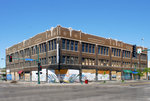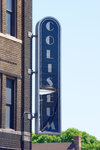






In an effort to save Lake Street’s iconic Coliseum Building from the wrecking ball, Redesign Inc. is purchasing the three-story brick building that has anchored the 27th and Lake intersection since 1917.
Redesign is paying $2 million to the building’s out-of-state owners who had intended to demolish the Longfellow landmark and sell off the land to the highest bidder.
Redesign’s action represents the second time in 25 years that a South Minneapolis community organization has stepped in to preserve the Coliseum. In the late 1990s, when the Coliseum was known as the Podany Building, the Longfellow Community Council organized a city-backed effort to block the sale of the building to a local slumlord. LCC located and helped fund a local developer who agreed to rehab the property and restore its original name.
Now, in 2021, Redesign wants to stabilize and preserve the 100-year-old building caught up in the civil unrest that rocked Lake Street in 2020.
“After the events of last year, we knew we needed to do whatever we could to help heal the community,” said Taylor Smrikarova, Redesign’s Coliseum project manager. “We felt responsible for 27th and Lake because it is in our service area and it was at the epicenter of the tragic events following the murder of George Floyd.”
It took a while for Smrikarova and the staff at Redesign to locate and begin negotiations with the Coliseum’s owners about a potential acquisition of the Lake Street property. When that connection was finally made last fall, the owners told Redesign that the building, itself, was worthless in their view, and that property’s only value was land on which it stood. “For us, the building did have value as a community asset, so we agreed to their asking price of $2 million,” Smrikarova said. “We were able to get in touch the demolition contractor who told us that the building had good bones, even though the interior was badly damaged. He saw no reason why the building had to come down.”
Redesign arranged financing for the Coliseum acquisition through a loan from Twin Cities Local Initiative Support Corporation (LISC), a non-profit financier that invests in affordable housing and commercial development in targeted neighborhoods. LISC brought together a group of banks, foundations and public agencies to establish a Community Asset Transition (CAT) fund to support projects like the Coliseum.
CAT’s intent is to help community-based organization gain control of key properties along damaged corridors, according to LISC’s Executive Director Peter McLaughlin. “We had memories of what happened in the wake of the Great Recession of 2008-09 when outside equity and capital came in from the coast and started buying up troubled properties,” McLaughlin told the Star Tribune’s Neal St. Anthony. “We didn’t want to see that happen on Lake Street. We wanted to keep local ownership.”
Smrikarova explained that her group will be able to purchase the Coliseum with the help of CAT funds, but that it will need to do additional fund raising to cover the cost of rehabbing the building. “We will do whatever we can to make sure the building does not stand vacant any longer than necessary. In the short term, we will be using public art to deliver the message that a new day is coming for the Coliseum.”
Redesign has put tother an innovative equity-building plan for the Coliseum with several BIPOC partners that include Chris Montana from Du Nord Craft Spirits, Alicia Belton with Urban Design Perspectives and Janice Downing at Commonsense Consulting @work. Montana intends to own and operate a tap for Du Nord on the Coliseum’s first floor. Belton will use a cooperative structure to provide ownership opportunities for BIPOC businesses that will occupy the second floor.
“After the near wholesale destruction of the area, the Coliseum is still standing; that means the building can represent resilience within the community but only if the building is put back into use, “said Montana.
“The recent history of the area demands that the building is not just rebuilt but is repurposed to address the underlying cause of its near-destruction. I’m proud to be a part of the effort Redesign, Alicia, and Janice are making for BIPOC collaboration and growth at this most important intersection.”
“For several years, we have had a dream to own a building where we can be a part of and create a community that values and supports business owners like us,” added Belton. “Redesign’s vision to make the Coliseum an opportunity to provide asset ownership is in alignment with our dream. What this means to us is that people who have been marginalized, overlooked, navigating systemic and institutional barriers will have a pathway to build capacity and achieve sustainable growth.”
Redesign’s efforts to acquire the Coliseum generated strong support from Lake Street area businesses. “At over 100 years old and 80,000 square feet, the Coliseum building is one of the largest and most consequential buildings left standing on Lake Street,” noted Lake Street Council’s Marie Compos. “Without efforts like Redesign’s we risk losing small businesses, which means losing local ownership, entrepreneurship, and control. I am really excited to see existing Lake Street businesses like Du Nord Craft Spirits expand into the Coliseum. It will be amazing to see their growth alongside flourishing BIPOC entrepreneurs in the building’s planned incubator space.”
“The Coliseum has such symbolic importance for so many of us,” added Smrikarova. “As we heal the Coliseum, it is a sign that the broader community along Lake Street is healing, as well.”
Comments
No comments on this item Please log in to comment by clicking here